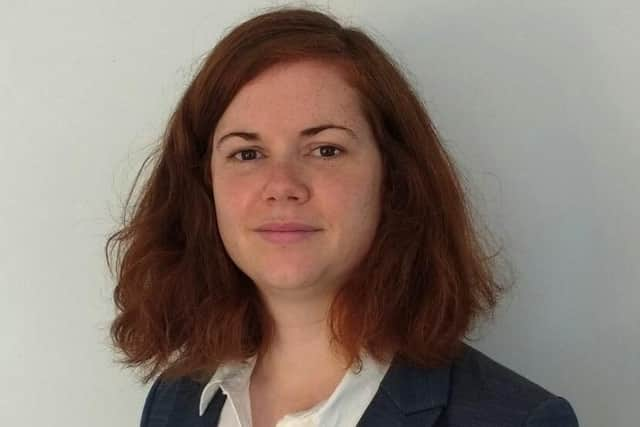Temperature breaks records by four degrees in city as University of Leeds climate expert gives warning for future
and live on Freeview channel 276
Dr Amanda Maycock, Associate Professor in Climate Dynamics at the University of Leeds, warned the temperatures reached in the last 48 hours could become more common if changes are not made.
Dr Maycock revealed a reading of 39.2 degrees Celsius was recorded on Wednesday at the University's weather station - far exceeding the previous record of 35 degrees in July 2019.
Advertisement
Hide AdAdvertisement
Hide AdThe national record was also broken at 40.3 degrees in Lincolnshire.


Speaking to the YEP on Wednesday, Dr Maycock said the change in temperature was a "huge leap" in one go and "unprecedented".
"At our University weather station the previous highest was 35 degrees", Dr Maycock said.
"Yesterday we measured 39.2 degrees.
"We smashed the previous record by about 4 degrees Celsius.


"Often we are used to thinking of these records being broken by a tenth of a degree but here it is several degrees.
"The national record went yesterday as well.
Advertisement
Hide AdAdvertisement
Hide Ad"These are big numbers, it really is an unprecedented event."
Dr Maycock said experts had observed similar heatwaves around the world "increasing in their number and intensity".
She added: "This is part of a wider pattern which we know is a consequence on the human influence on the climate, the greenhouse gas emissions we have made in the last 150 years or so and the warming of the planet by 1.2 degrees is making these events more extreme and impactful.
"We have seen across the country rare occurrences, wildfires breaking out where you wouldn't expect to see them, transport systems being disrupted.
Advertisement
Hide AdAdvertisement
Hide Ad"Trains were cancelled out of Leeds, the rails in the heat not coping."
Dr Maycock said the UK was "not well set up" to cope with the extreme temperatures due to their rarity.
"In general we are not well set up", she said.
"We have never had to be set up to cope with this type of extreme.
"But now we find ourselves experiencing things we have never experienced before.
Advertisement
Hide AdAdvertisement
Hide Ad"We have to think about adapting what we do and how we do it to be able to live with the fact these events will occur again in the future."
Looking to the future, Dr Maycock said the climate change the UK has already experienced "isn't going to go away".
She said climate change was not "a can to be kicked down the road" and instead an immediate issue which needs addressing.
"We can't get rid of that warming", she added.
"It is here to stay for a long time to come.
"Adaptation and learning how to live with this type of event is something we are going to have to do.
Advertisement
Hide AdAdvertisement
Hide Ad"Observing 40 degrees temperatures in the UK is not just a pipe dream now, it is a reality.
Dr Jim Parker is a researcher at Leeds Beckett University in the sustainable unit.
Speaking to the YEP, he said Leeds is not exempt from global heatwaves forecast to become more intense in the future.
"Big city regions like Leeds also suffer for the Urban Heat Island effect.
Advertisement
Hide AdAdvertisement
Hide Ad"This means cities stay hotter for longer than the surrounding countryside due to the mass and low albedo (meaning less short-wave radiation from the sun is reflected) qualities of the materials we use to build our cities.
"Man-made materials more easily absorb and retain heat whereas plants heat up in the day but cool much more rapidly overnight.
"The heat island effect can be mitigated by green space, and especially larger groups of trees which have numerous benefits.
"However, more intense development in lieu of green space will exacerbate the problem, along with additional air conditioning and traffic which all make things worse."
Advertisement
Hide AdAdvertisement
Hide AdDr Parker said heatwaves have "various negative impacts, not least on health".
"They are also linked to spikes in antisocial behaviour for instance", he added.
"Our own research has shown that the urban heat island can mean Leeds is between 5-6°C hotter than the rural areas at peak times, but also that park spaces in the city can be 2-3°C cooler than the surrounding built-up areas.
"So more trees!"
Dr Parker said the University team is already working with Leeds Council to measure the impact on green space in the city,.
Advertisement
Hide AdAdvertisement
Hide Ad"There is still a lot that needs to change for our homes and workplaces to adapt though", he added.
"Poorer quality buildings often suffer more from heat stress.
"I’m also concerned that the changing climate will be yet another issue that widens the gap between the rich and the poor and leads to more inequality.
"More positively, it will hopefully highlight the benefits and value of more natural passive solutions, such as increased green and blue spaces which have a multitude of benefits past making things a bit cooler."
_______
Advertisement
Hide AdAdvertisement
Hide AdTop tips to help tackle climate change given by Amanda Maycock:
Reduce your consumption of meat and dairy which uses more greenhouse gases to produce
Where possible, buy electric cars rather than petrol or diesel
Use public transport wherever possible
Cycle or walk shorter journeys rather than use a car
Purchase second hand clothes rather than new to help reduce the amount of manufacturing
Think about what you are using on a day to day basis and if possible reuse and recycle as much as possible to reduce your impact on the planet